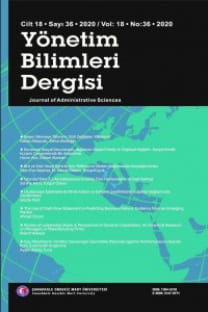Kopenhag Siyasi Kriterlerinin Türkiye'nin Ulusal Güvenliğine Yansımaları
Implications of the Copenhagen Political Criteria for Turkey's National Security
___
- ARAS Bülent ve POLAT Rabia K., "From Conflict to Cooperation: Desecuritization of Turkey's Relations with Syria and Iran", Security Dialogue, 2008, Volume: 39, Issue 5.
- AYDIN Mustafa, "Securitization of History and Geography: Understanding of Security in Turkey", Southeast European and Black Sea Studies, 2003, Volume 3, Issue 2.
- BİLGİN Pınar, "Turkey's Changing Security Discourses: The Challenge of Globalisation", European Journal of Political Research, Volume:44, Issue:1.
- BELLAMY Alex ve MCDONALD Matt, "Securing International Society: Towards an English School Discourse of Security", Australian Journal of Political Science, 2004, Volume 39, Number 2.
- BEHNKE Andreas, "The Message or the Messenger? Reflections on the Role of Security Experts", Cooperation and Conflict, 2000, Volume 35, Issue 1.
- BÖRZEL Tanja A. ve RISSE Thomas, "When Europe Hits Home. Europeanization and Domestic Change", European Integration online Papers (EIoP), 2000, Volume 4, N°15.
- BUZAN Bary, "Peace, Power and Security: Contending Concepts in the Study of International Relations", Journal of Peace Research, 1984, Volume 21, Issue 2.
- BUZAN Bary, "New Patterns of Global Security in the Twenty-First Security", International Affairs, 1991, Volume 67, Number 3.
- CEBECİ Münevver, Tehdit Algılamasında Yapısal ve Konjonktürel Nitelikler/İthal Tehditler, Türkiye'ye Yönelik Dış Kaynaklı Risk ve Tehditler Sempozyumu, T.C. Genelkurmay Başkanlığı Harp Akademileri Komutanlığı SAREN Müdürlüğü, Harp Akademileri Basımevi, İstanbul, 05-06 Nisan 2007.
- CHA Victor D., "Globalization and the Study of International Security", Journal of Peace Research, 2000, Volume 37, Issue 3.
- CHECKEL Jeffrey T., "Compliace and Conditionality", Arena Working Papers, WP 00/18.
- DAVUTOĞLU Ahmet, Stratejik Derinlik: Türkiye'nin Uluslararası Konumu, Küre Yayınları, İstanbul, 2009.
- HUYSMANS Jef, "The Question of the Limit: Desecuritization and the Aesthetics of Horror in Political Realism", Millennium, Volume 27, Issue 3.
- KARATOCHWIL Friedrich, 'Norms vs. Numbers, Multilateralism and the Rationalist and Reflexivist Approaches to Institutions, A Unilateral Plea for Communicative Rationality', Joh G. Ruggie, (ed.), Multilateralism Matters: The Theory and Praxix of An Institutional Form, Columbia University Press, New York, 1993.
- KARAOSMANOĞLU Ali L., Turkish Security Culture: Evolutionary or Carved in Stone, Peter M. E. Volten (ed.). Perceptions and Misperceptions in the EU and Turkey: Stumbling Blocks on the Road to Accession, Groningen, The Centre of European Security Studies (CESS), 2009.
- MARCH James G. ve OLSEN Johan P., "The Institutional Dynamics of International Political Orders",' International Organization, 1998, Volume 51, Issue 1.
- OVALI A. Şevket, "Masadan Sahaya Geçiş: Yeni Güvenlik Kurgusunun Uluslararası Politikadaki Yansımaları", 2004, Avrasya Dosyası Cilt: 10, Sayı :4.
- ÖZCAN Gencer, Doksanlı Yıllarda Türkiye'nin Değişen Güvenlik Ortamı, Gencer Özcan ve Şule Kut (der.), En Uzun Onyıl: Türkiye'nin Ulusal Güvenlik ve Dış Politika Gündeminde Doksanlı Yıllar, İstanbul, Büke Yayıncılık, 2000.
- ÜLMAN Burak, Türkiye'nin Yeni Güvenlik Algılamaları ve Bölücülük, Gencer Özcan ve Şule Kut (der.), En Uzun Onyıl: Türkiye'nin Ulusal Güvenlik ve Dış Politika Gündeminde Doksanlı Yıllar, İstanbul, Büke Yayıncılık, 2000.
- UZGEL İlhan, Ulusal Çıkar ve Dış Politika, İmge Kitabevi Yayınları, Ankara, 2004.
- WAEVER Ole, "European Security Identities", Journal of Common Market Studies, 1996, Volume 34, Number 1.
- WAEVER Ole, Securitization and Desecuritization, Ronnie D. Lipshutz (ed.), On Security, Columbia University Pres, New York, 1995.
- WAEVER Ole, Securitization and Desecuritization, Ronnie D. Lipshutz (ed.), On Security, Columbia University Pres, New York, 1995.
- WILLIAMS Michael C., "Words, Images, Enemies: Securitization and International Politics", International Studies Quarterly, Volume 47, Issue 4.
- Anadolu Ajansı Resmi İnternet Sayfası, http://www.aa.com.tr
- CNN TÜRK Resmi İnternet Sayfası, http://tv.cnnturk.com
- NTV Resmi İnternet Sayfası, http://arsiv.ntvmsnbc.com/news
- Habertürk Resmi İnternet Sayfası, http://video.haberturk.com
- TBMM Resmi İnternet sayfası,, http://www2.tbmm.gov.tr
- T.C. Avrupa Birliği Bakanlığı Resmi İnternet Sayfası, http://www.abgs.gov.tr
- T.C. Başbakanlık Mevzuatı Geliştirme ve Yayın Genel Müdürlüğü Mevzuat Bilgi Sistemi Resmi İnternet Sayfası, http://www.mevzuat.gov.tr
- T.C. İçişleri Bakanlı Resmi İnternet Sayfası, http://www.icisleribasin.gov.tr
- T.C. Milli Güvenlik Kurulu Resmi İnternet Sayfası http://www.mgk.gov.tr
- T.C. Resmi Gazete Resmi İnternet Sayfası http://www.resmigazete.gov.tr
- Hürriyet Gazetesi.
- Milliyet Gazetesi.
- Radikal Gazetesi.
- Sabah Gazetesi.
- Zaman Gazetesi
- ISSN: 1304-5318
- Yayın Aralığı: 4
- Başlangıç: 2003
- Yayıncı: Yönetim Bilimleri Dergisi
İşsizlik ve Eğitim Seviyesinin İntihar Üzerindeki Etkisi: TÜİK Verileri Üzerine Ampirik Bir Çalışma
Özel Okullarda Markalaşma: Aydın İlindeki Özel Okulların Markalaşma Politikaları
Entrepreneurial Intentions of Turkish Business Students: An Exploration Using Shapero's Model
Yerel Vergi Bilincinin Faktör Analizi ile Değerlendirilmesi: Bursa Örneği
Women in Academia in Turkey: Challenges and Opportunities
Bankacılık Sektöründe Algılanan Hizmet Kalitesinin Müşteri Memnuniyeti Üzerine Etkisi
